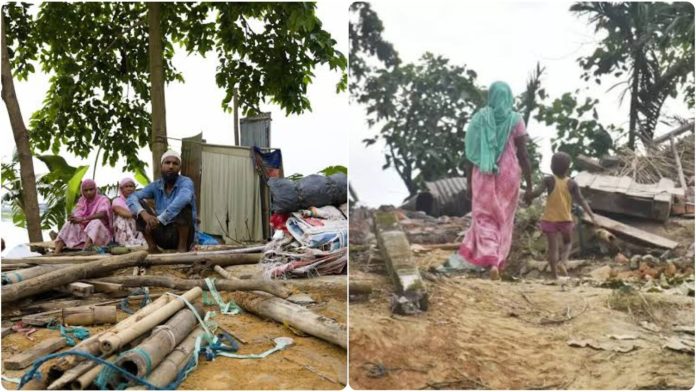Goalpara, Assam – In a deeply distressing humanitarian crisis, the Goalpara district administration in Assam has launched a large-scale eviction drive in the Hasila Beel area, leaving more than 660 Muslim families homeless. The demolitions, which began on June 16, 2025, were carried out under the alleged pretext of removing “illegal encroachments” on wetland land, affecting an estimated 3,500 to 4,200 people, including children, the elderly, and pregnant women, reported the Guwahati News.
This eviction, supervised by Goalpara District Commissioner Khanindra Chowdhury, has drawn sharp criticism from civil society groups, political parties, and human rights defenders, especially due to its timing, intensity, and communal overtones.
The affected families, mostly daily wage earners and erosion victims from Goalpara and Barpeta districts, claim they have lived in the area for over four to six decades, having even purchased land informally from local residents.
Despite this, the administration gave a mere two-day notice on June 14, violating the standard 15-day eviction notice period. On June 16 and 17, the administration deployed 20 excavators and bulldozers, backed by heavy security personnel, to raze permanent structures, including five government primary schools, three mosques, and even a Jal Jeevan Mission water project.
Residents report being caught completely off-guard, with houses demolished at 5:30 am, forcing families to flee with nothing but a few belongings.
“All my life we have lived here. My father was born here. Where do we go now?” asks Suleman Ali, 50, standing amidst the rubble of his home.
“I have four children. Where do we sleep? Our food, utensils, even toilets—everything is gone,” said Nurija Khatun, weeping beside her destroyed home.
Despite Supreme Court directives mandating alternative rehabilitation before eviction, no relief or resettlement assistance has been provided to date. Families are now surviving in makeshift tents made of plastic sheets, with no access to toilets, food, water, baby supplies, or electricity, all during humid, rainy weather.
Children and the elderly are falling ill, with reports of people fainting due to hunger and heat. School children are missing exams, and many fear permanent dropouts due to displacement.
“Tell me what to do – move my crying family or study for my exam?” asked 15-year-old Faizul Islam, an eighth-grade student.
Chief Minister Himanta Biswa Sarma, in controversial remarks, alleged that Muslims from Barpeta had “encroached” on Goalpara lands and registered as voters to turn the constituency Muslim-dominated. He stated that had they not “encroached,” a Hindu MLA would have been elected from Goalpara.
He claimed that flood victims should have informed authorities to be settled in Barpeta and receive half a bigha of land per family. Critics argue that this blatantly communal statement reveals the true motive behind the evictions.
Local organizations and opposition parties have strongly condemned the move, calling it an act of systematic displacement targeting Muslims, particularly Bengali-origin Muslims, often referred to as “Miya Muslims” and unfairly branded as illegal Bangladeshi immigrants.
“We are genuine Indian citizens with Aadhaar, Voter IDs, PAN cards, and legacy documents,” asserted Anowaruz Zaman, one of the displaced residents.
According to Supreme Court rulings, evictions from government land must be preceded by adequate rehabilitation to protect the right to shelter, a fundamental right under Article 21. However, in Goalpara, this legal obligation was completely ignored.
Congress leaders Gaurav Gogoi, Rekibuddin Ahmed, and Debabrata Saikia criticized the eviction, calling it inhumane and a violation of legal norms. Saikia had earlier written to CM Sarma urging a halt, citing state and central guidelines.
Gogoi reminded the BJP of PM Modi’s own promises under the Pradhan Mantri Awas Yojana, stating, “You cannot demolish homes without giving people an alternative place to live.”
Multiple political and civil society delegations attempting to reach Hasila Beel were denied access by the administration. A team from Jamaat-e-Islami Hind, Assam North, led by Zohurul Islam Mollah, was also stopped en route.
Minority organizations such as the All Assam Minority Students’ Union (AAMSU), North East Muslim Students Union (NEMSU), and AIUDF condemned the operation as part of a larger BJP strategy to polarize voters ahead of upcoming elections.
Since 2016, more than 10,620 families have been evicted from government land under the BJP regime. The current wave began with CM Sarma’s appointment in May 2021 and has intensified with hundreds of families displaced in Bandarmatha (2024) and Kachutoli, where two Muslim teens died during eviction.
According to state assembly data from August 2024, the government has acknowledged four deaths during eviction drives, with additional unreported fatalities surfacing.
Now, reports suggest the administration is planning an even larger eviction in the Maylaparher area, potentially displacing 20,000 more Muslims.
The Hasila Beel eviction is not just a story of land and legality—it’s a human rights crisis. Stripping citizens of shelter, dignity, and hope without following due process raises serious ethical, legal, and humanitarian concerns. As rains fall on plastic tents and children go hungry, the world watches a tragedy unfold in silence.




